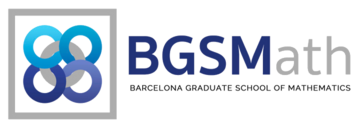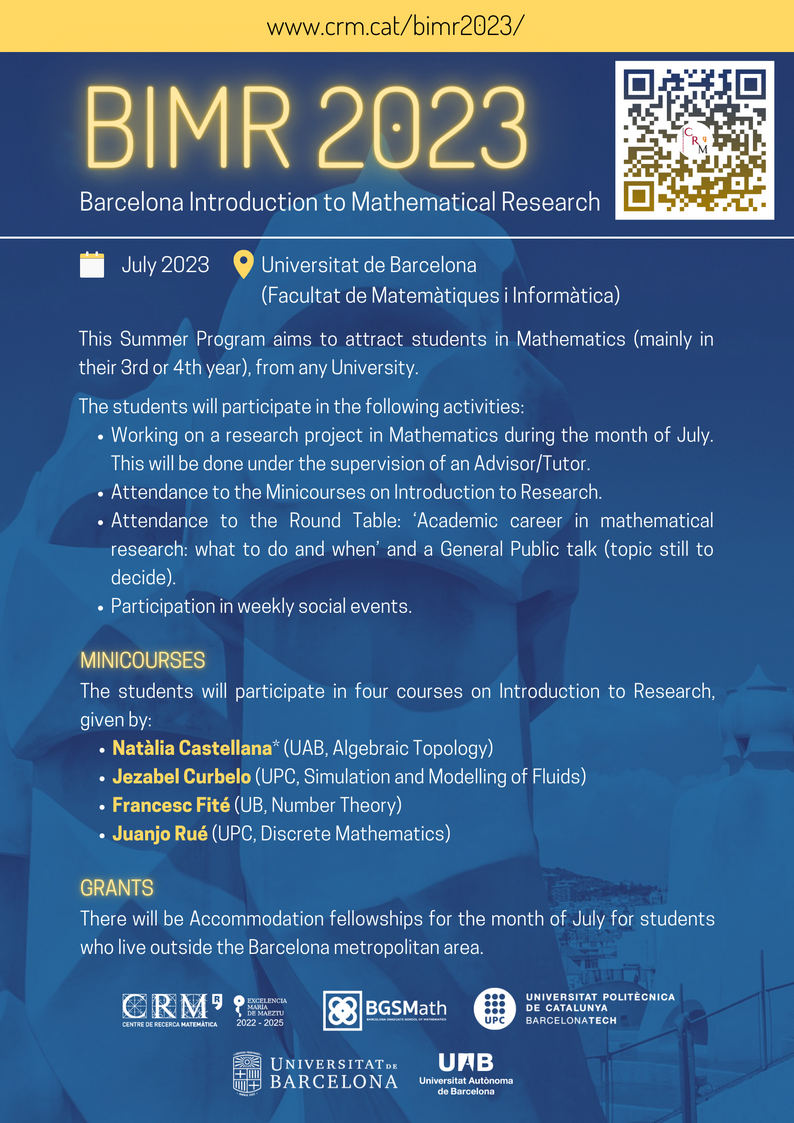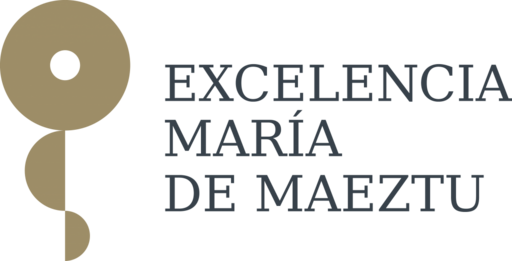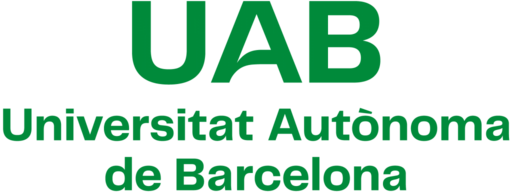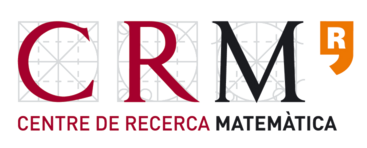SCHEDULE
INTRODUCTION
This new edition of the ‘Barcelona Introduction to Mathematical Research’ Summer School, now under the BGSMath aims to attract students in Mathematics (mainly in their 3rd or 4th year), from any University (in Barcelona or elsewhere).
The students will participate in the following activities:
- Working on a research project in Mathematics during the month of July. This will be done under the supervision of an Advisor/Tutor, and may consist of reading one or a few research papers (or book chapters), or working on a small open problem.
- Attendance to the Minicourses on Introduction to Research that will take pace during the weeks of July 3-7 and 10-14.
- Attendance to the Round Table: ‘Academic career in mathematical research: what to do and when’ and a General Public talk (topic still to decide), that will take place during the afternoon in mid-July.
- Participation in weekly social events (coffee breaks during the minicourses, and one social pizza evening for each week of July).
RESEARCH PROJECT
The students will work on a research project in Mathematics during the month of July 2023.
This will be done under the supervision of a senior Advisor, and will consist of reading one or a few research papers (or book chapters) and/or working on a small open problem.
A committee will assign the students to their senior Advisors based on the preferences of both.
LIST OF PROJECTS AND ADVISORS
MINICOURSES
The students will participate in four courses on Introduction to Research, given by:
Natàlia Castellana (UAB, Algebraic Topology)
What algebraic topology can do for you
In this minicourse, the goal is to introduce the basic idea underlying the research area of algebraic topology. Roughly speaking, algebraic topology provides algebraic tools to distinguish/detect properties of topological spaces up to continuous deformations. The notion of continuous deformation is formalized in the concept of homotopy which leads to the the area of homotopy theory. First I will introduce the notion of homotopy theory and how it can be used to define well-behaved algebraic structures associated to spaces (homotopy groups, homology) which allow to translate ‘equations’ in topology to ‘equations’ in algebraic settings where more structure can be used. I will finish with a couple of relevant examples on how these tools where crucial to solve questions which apparently are not related to algebraic topology.
Jezabel Curbelo (UPC, Applied Mathematics)
Francesc Fité (UB, Number Theory)
Linear representations of finite groups with some classical applications
One of the main tools for the study of groups is representation and character theory. In this course, we will learn the rudiments of the theory of representations of finite groups over the complex numbers. In the first part, we will cover the basic material: the complete reducibility theorem, the orthogonality relations, the group algebra, the integrality properties of characters, and the induction of characters. In the second part, we will apply this theory to provide beautiful and elegant proofs of some classical results about finite groups (the theorems of Burnside, Minkowski, and Frobenius). We will not assume the audience has previous knowledge of Galois theory or algebraic number theory: instead we will briefly introduce along the way the notions from these areas that become necessary for our discussion.
Juanjo Rué (UPC, Discrete Mathematics)
Some pearls around Roth’s theorem
Roth’s theorem is one of the cornerstones in combinatorial number theory. It states that it is not possible to have dense sets of integers avoiding (non-trivial) 3-arithmetic progressions. This theorem, which solves the first non-trivial case of an important conjecture due to Erdős and Turán, has been very influential in the development of modern combinatorics, and several Field medallists and Abel prize awardees had worked on that particular problem (Roth himself Bourgain, Gowers,Tao and Szemerédi, among others).
In this short course we will see a couple of proofs of this result (combinatorial and analytic) and exploit what in combinatorics we know as the dichotomy “structureness-randomness”. Limitations of the methods in order to deal with longer arithmetic progressions will be discussed as well.
Each of these courses will be 5h long, and will take place at Facultat de Matemàtiques i Informàtica de la Universitat de Barcelona.
OTHER ACTIVITIES
The students will participate in the following activities:
- Round Table: ‘Academic career in mathematical research: what to do and when’.
- Weekly social events: coffee breaks during the minicourses, and a social pizza evening each week of July.
GRANTS
There will be Accommodation fellowships for the month of July for students who live outside the Barcelona metropolitan area.
APPLICATIONS
The selection of applicants will be done based on:
-
- Expression of interest.
- CV.
- Academic transcript.
- A recommendation letter.
- The expected number of students is around 25 participants.
APPLICATION FORM (CLOSED)
timeline
Applications will open: January/February 2023.
Application deadline: 19th March 2023.
Resolutions: will be sent by April 15th.
Summer Program: July 3rd – July 28th.
organizers
Paloma Bengoechea | Universitat de Barcelona
Gemma Huguet | Universitat Politècnica de Catalunya
Wolfgang Pitsch | Universitat Autònoma de Barcelona
Xavier Ros Oton | Universitat de Barcelona
past editions
BIMR 2022
|
For inquiries about this event please contact the Scientific Events Coordinator Ms. Núria Hernández at nhernandez@crm.cat
|


